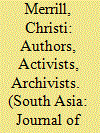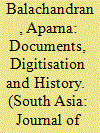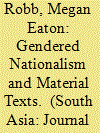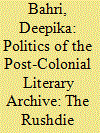|
|
|
Sort Order |
|
|
|
Items / Page
|
|
|
|
|
|
|
| Srl | Item |
| 1 |
ID:
184805


|
|
|
|
|
| Summary/Abstract |
B.R. Ambedkar’s time at Columbia University (1913–16) left an enduring mark on his social and political thought. This essay discusses efforts by the Ambedkar Initiative to draw on private papers, personal correspondence and other archival material to develop a finding aid documenting Ambedkar’s time at Columbia in the interest of deepened scholarly access, public pedagogy and institutional accountability. The Initiative brings the world’s oldest and the world’s largest democracy into a shared field of engagement, with the finding aid approaching the Ambedkar Archive in America and in India together as a transnational archive, each shaped by distinct logics of curation impelled by divergent ethical and political stakes. Considering them together can reframe conversations about Columbia University’s awkward relationship with issues of public access, critical pedagogy and mass intellectuality.
|
|
|
|
|
|
|
|
|
|
|
|
|
|
|
|
| 2 |
ID:
184800


|
|
|
|
|
| Summary/Abstract |
This essay considers several literary archives connected to Bombay/Mumbai: the ‘Bombay poets’ and Bombay modernisms archive; the archives of the PEN All-India Centre and those of the US-backed liberal ‘front’ in the Cultural Cold War. What does the vulnerability of these archives tell us of the practices, poetics and the politics of these writers, and what may bind them together? ‘Minority’, also epitomised by the figure of Nissim Ezekiel, is the key word here, and I will decline its many forms. I also argue for a revaluation of ‘minority’ that may be less a predicament than a condition of worldliness and a prerequisite for (creative and critical) freedom. These ‘archives of minority’, like many of the little magazines of the 1950s and 1960s, often stood up to authority. But if minority can be a ‘resource’ it’s also in the sense of a certain type of archival work. Recollecting histories from these apparently worthless snippets of world literature is all the more rewarding as they unsettle the dividing lines between what is obscure and canonical, local and worldly, trivial and political.
|
|
|
|
|
|
|
|
|
|
|
|
|
|
|
|
| 3 |
ID:
184806


|
|
|
|
|
| Summary/Abstract |
In 2014, two sets of Dalit literature scholars based in the West started working on two different collaborative grant projects that announced themselves as ‘networks’: Nicole Thiara and Judith Misrahi-Barak received AHRC funding to organise a series of programmes for the Dalit Literature Network, and Christi Merrill and her colleagues at the University of Michigan received internal funding to develop a suite of digital tools called Translation Networks (TN). In this dialogue with Francesca Orsini, Merrill uses examples from the overlap between these two different networks to describe how the TN concept mapping tool helps users visualise underlying scholarly infrastructures they depend on and in the process disrupt many of the binaries and hierarchies built into conventional archiving tools.
|
|
|
|
|
|
|
|
|
|
|
|
|
|
|
|
| 4 |
ID:
184804


|
|
|
|
|
| Summary/Abstract |
Recent years have seen a very large rise in digitisation projects in various state-administered archives in India, including the National Archives of India and regional archives in different parts of the country. This essay argues that rather than increasing access and transparency, digitisation serves to reproduce and potentially even increase state control over historical sources and memory. In addition, the elision of context in digitised collections in state archives poses problems for historical research, particularly for scholars from less privileged institutions. It is imperative that these efforts go beyond an understanding of digitisation as conservation alone in order to harness the creative and pedagogical possibilities offered by digital technology to influence, and even transform, the historical scholarship of a wide variety of users.
|
|
|
|
|
|
|
|
|
|
|
|
|
|
|
|
| 5 |
ID:
184803


|
|
|
|
|
| Summary/Abstract |
The Cornell Bombay Poets’ Archive was initially started with Adil Jussawalla’s donation of his massive archive to the Special Collections at Cornell University. Jussawalla has been collecting and documenting the state of Indian letters, more precisely the state of Indian poetry, for over fifty years. This essay takes a representative archival document from this collection to show the abiding engagements of the poet with the world in which he lived. This text is a planner/diary (a ‘date book’), which contains a set of notes for an unwritten novel from the 1970s, when Adil Jussawalla’s career as poet and writer was in its early stages. The planner/diary shows us the multiple trajectories of the conflicted space of the English writer in post-Independence India that we must heed when studying Indian modernisms: the peculiar combinations of pasts and presents to create an Indian modern; the combination of the trans-regional with the translocal with the deeply personal; and the refusal to sentimentalise anything.
|
|
|
|
|
|
|
|
|
|
|
|
|
|
|
|
| 6 |
ID:
184797


|
|
|
|
|
| Summary/Abstract |
From 1948 to 1994, the newsreels and documentaries produced by the Films Division of India (FD) were a ubiquitous presence in Indian public life. Even as some audiences learnt to avoid sitting through yet another newsreel about the benefits of economic planning, the FD vision of harmonious, planned development continued to haunt the collective unconscious of post-colonial India well into the 1980s. Drawing on examples from documentary cinema, Indian New Wave films, and modern Hindi literature, this article explores three scenes of disillusionment with the FD’s version of the Nehruvian dream. I argue that the FD archive is a particularly productive site from which we can ask uncomfortable questions about the experience of Nehruvian socialism: the ‘illusions’ of the past continue to haunt FD films even in moments of disillusionment, prompting a form of self-reckoning whose full implications can only be grasped now, in retrospect.
|
|
|
|
|
|
|
|
|
|
|
|
|
|
|
|
| 7 |
ID:
184801


|
|
|
|
|
| Summary/Abstract |
While there exists a substantial body of work on the reformist writings and women’s periodicals of the late colonial period, this article contributes to a newer conversation extending analysis of print periodicals into the post-colonial period through a discursive and material analysis of Akhbār-e Khavātīn (Women’s Newspaper), a Karachi magazine from 1966 edited by a journalist named Mussarat Jabin. Paying attention to how a woman’s magazine was produced, collected and archived makes visible the previously invisible choices of print technicians, editors and collectors. Even though the conditions of many of these choices remain obscured, this article argues that attention to the material conditions of printing and archiving offer new avenues for reflection. Akhbār-e Khavātīn normalised women’s journalism, and also gestured towards the presence of male editors and owners, technicians who collaborated with the editors to create print periodicals, and towards the American archivists who sought to preserve the magazines for nationalist aims.
|
|
|
|
|
|
|
|
|
|
|
|
|
|
|
|
| 8 |
ID:
184796


|
|
|
|
|
| Summary/Abstract |
In his poem, ‘Bharati Bhavan Library, Chowk, Allahabad’, Arvind Krishna Mehrotra meditates on the different temporalities and regional, national and transnational vectors that crisscross this unpretentious lending library in the busiest part of the old city, Chowk. The poem opens with a scene from 1923, when the poet imagines the reading room busy with people borrowing to read
|
|
|
|
|
|
|
|
|
|
|
|
|
|
|
|
| 9 |
ID:
184798


|
|
|
|
|
| Summary/Abstract |
South Asian collections in the West have complex histories. Usually started at the time of colonial rule and built on practices of acquisition, they often involved the removal of manuscripts and books from the subcontinent with little or no compensation to the owners. This in turn created gaps in knowledge locally. While following the founding of the independent, post-colonial nation-states, acquisition practices changed, a culture of coloniality continued through book exchanges and the classification system rooted in Western frameworks of knowledge and colonial mindsets. Moreover, for scholars outside the physical libraries, there are barriers to access the collections. Looking at current library practices, and with University of Wisconsin-Madison’s collections as a case study, this article outlines some historical problematics and points towards new directions in working toward decolonising the library.
|
|
|
|
|
|
|
|
|
|
|
|
|
|
|
|
| 10 |
ID:
184802


|
|
|
|
|
| Summary/Abstract |
Using the Rushdie papers as a case study, this essay discusses questions of commodification, access, preservation and cultural nationalism related to the acquisition of the literary archives of post-colonial authors. Who should own this archive? What is the archival fate of writers with a tenuous relationship with their place of birth? Finally, how does the well-guarded, commodified, expensively acquired archive privilege aura and secrecy over the treasures in the readily available, published literary corpus? This reading suggests that we need to attend equally to the aesthetic value of the literary imagination as part of the discussion in archival studies.
|
|
|
|
|
|
|
|
|
|
|
|
|
|
|
|
| 11 |
ID:
184799


|
|
|
|
|
| Summary/Abstract |
Indian magazines and print culture in general have been studied more thoroughly for the colonial period, but the 1950s–1970s have rightly been called the golden age of magazine culture. In Hindi literary lore, magazines loom large as the main platform for literature, where poets and fiction writers found readers and recognition and critics debated aesthetics and ideology. To borrow Amit Chaudhuri’s phrase, magazines were sites of intense ‘literary activism’: an activism by editors on behalf of literature to champion new writers and encourage readers’ tastes, but also a constant critical interrogation on the value and function of literature. Despite their ephemeral nature—particularly in the Hindi context where old books and periodicals tend to be sold in bulk as scrap paper—magazines embody, and capture for us eager after-readers, a lively community of readers and writers. This essay explores the multilingual ‘ecology’ of Hindi and English literary and middlebrow magazines, including Kahānī, Kalpanā, Sārikā, Saritā and Caravan.
|
|
|
|
|
|
|
|
|
|
|
|
|
|
|
|
|
|
|
|
|